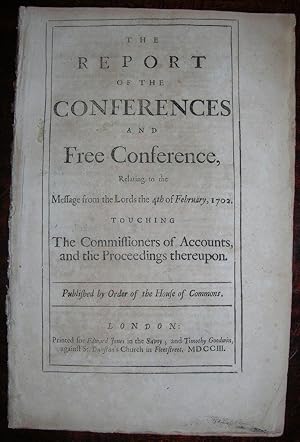Descripción
MONTAGU, Charles, earl of Halifax (1661 1715). The Report of the Conferences and Free Conference, Relating to the Message from the Lords the 4th of February, 1702. Touching The Commissioners of Accounts, and the Proceedings thereupon. London: Printed for Edward Jones in the Savoy; and Timothy Goodwin, against St. Dunstan's Church in Fleet Street. 1703. Folio (12 x 7 4/8 inches). 28-pages, numbered 39-64. (Disbound, browned). Concerning the conduct of Charles Montagu, earl of Halifax (1661 1715), while Chancellor of the Exchequer, and as a side-issue, whether or not the House of Lords had the right to examine the accounts of the House of Commons. First appointed to the Treasury board in March of 1692, "Montagu was at the heart of the Treasury when the legislation founding the Bank of England was devised in the 1693 1694 session. Although the plans were based on the ideas of William Paterson and Michael Godfrey, Montagu played an important role in the negotiations and his performance was recognized in May when he was appointed to succeed the ailing Richard Hampden as chancellor of the exchequer, and was sworn a privy councillor; both appointments were dated 10 May 1694.On 1 May 1697 Montagu became first lord of the Treasury, holding off the claims of Sir Stephen Fox to precedence in the new board, and in November he was sworn a member of the cabinet council.The 1698 9 session saw Montagu fail to prevent the Disbanding Bill and consequently lose some of the king's confidence. At the end of the session Montagu relinquished the chancellorship, but he remained first lord and he was named in June 1699 as a lord justice. With a potentially troubled session ahead, on 15 November 1699, on the eve of parliament's reassembly, he retired from the Treasury altogether.However, in politics at least Montagu was no longer pre-eminent in the Commons and on 13 December 1700 he was created Baron Halifax.Halifax took his seat in the Lords on 11 February 1701. On 14 April 1701 he was impeached by the House of Commons in an indictment containing six articles, most of which referred to the procurement of grants, but which included as the most serious charge his role in the first partition treaty, which James Vernon had communicated to him in August 1698. The case collapsed and the impeachment was discharged in June 1701. "The accession of Queen Anne saw Halifax dismissed from the privy council in March 1702, and for the next eight years his claims to high financial office were blocked by the incumbent lord treasurer, Lord Godolphin. Halifax remained a whig partisan and in January 1703 the tory majority in the House of Commons passed a motion accusing him of circumventing the traditional accounting procedures in the exchequer. Halifax defended his actions on the ground that more efficient methods were required given the vast sums of money which had to be audited in wartime. Although the House of Lords vindicated Halifax in February 1703 by voting him a person diligent and faithful in his office , he had to face prosecution by the attorney-general in a case which eventually petered out in June of the following year with a nolle prosequi after Halifax had not answered the information and stood on his parliamentary privilege" (Stuart Handley for DNB). ESTC N49273. Catalogued by Kate Hunter. N° de ref. del artículo 72LIB1279
Contactar al vendedor
Denunciar este artículo
![]()
